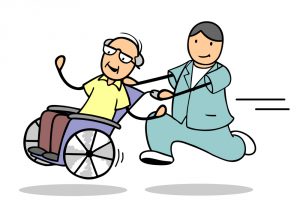Night shifts are a necessary part of healthcare. In any hospital or inpatient facility, activity slows at night, but nursing care continues around the clock. Frequently new employees will begin and remain on the night shift until a position on the day shift opens. Some facilities require rotating shifts or schedule staff to fill in for night staff vacations.
Adapting to the night shift can be one of the biggest challenges for a CNA. Many of the duties remain the same as during the day shift, yet fatigue can make the tasks seem harder. The human brain tells us to slow down and sleep when it’s dark. It releases hormones that keep our internal “clocks” on schedule, so that we’ll be alert during the day. Staying awake all night confuses both the brain and the body.
The key to not just surviving, but thriving on the night shift is to get adequate rest. Sleeping well during the day is essential. Just how to do that?
9 Tips from Experienced Night Staffers:
- 1
Keep the same sleep schedule
While you occasionally may need to interrupt your sleep for an important activity, your best strategy is to maintain a consistent sleep pattern. Whether you prefer to go directly to bed when you get home or stay awake for awhile, follow that schedule.
- 2
Mimic night during the day
Make your bedroom as dark as possible with room-darkening shades or curtains. Wear a sleep mask to keep your eyes from sensing light; when the brain perceives darkness, it produces melatonin, the sleep hormone. Ear plugs can help by keeping daytime noises out. Some people also like a white noise machine or phone app, which blocks noise with soft moving air.
- 3
Be careful with caffeine
Caffeine (coffee, tea, and energy drinks) can give you a boost at the start of your shift and can be tempting to continue throughout the night. But cut it off at least four hours before the end of your shift so you’ll be sleepy when you get home.
- 4
Eat a good “breakfast” before work
Just like your mother told you, you need fuel to get through the day…or in this case, the night. Avoid sugar and refined foods before and during the shift. Bring protein, nuts, fruits, and vegetables for snacks. Small portions every few hours will keep your blood sugar stable. Be sure and stay hydrated, too.
- 5
Lighting is important
To “fool” the brain, you’ll need a source of light during the shift. Most facilities dim the lights at night so patients and residents can sleep. Try and keep lights turned up at the nursing station and break room. However, on your way home you should put on sunglasses to reduce direct daylight, which can stimulate your brain.
- 6
Keep busy all night
Traditionally, the night shift has some responsibilities that support the busier day shift. Folding linens, stocking supplies, cleaning work areas, wiping wheelchairs, and assisting the early-risers are some of the duties. It’s a good idea to bring something to do for slow nights. A book or magazine, Sudoku puzzles, or simple knitting—activities that can quickly be set aside to help a resident—can keep the brain occupied.
- 7
Get to know your co-workers
Time goes more quickly when you’re engaged with others. Help each other out; with fewer resources than during the day, you’ll get creative when a new glitch pops up. You’ll also have a chance to get to know each other; lifelong friendships develop on the night shift.
- 8
Create a community of support
Working nights can be stressful on you, as well as your family and friends. When you’re on the opposite schedule from others, it takes awhile for them to realize that because you’re “home” during the day doesn’t mean that you are available. You need sleep. Remind them not to call unless there is an emergency. Specify certain times for communication. Use notes and bulletin boards to post updates. Plan family time and “date nights” for your days off.
- 9
See a doctor if nothing works
Do not use alcohol for sleep; it may seem to get you to sleep, but it can actually keep you awake as it metabolizes. Melatonin supplements or over-the-counter sleep aids, available at drug stores and pharmacies, can be useful. However, if you find you need to take something on a regular basis, it’s time to get help. Before using sleeping pills, make an appointment with your primary care provider. He or she can evaluate your overall health, including other possible sleep conditions, such as sleep apnea or restless leg syndrome.
Benefits of working “odd” hours
Are there any benefits to staying on the night shift?
Some people discover that they really enjoy it. Those who choose to work that schedule like it because of:
- Shift differential. With extra hourly pay for nights (and sometimes more for weekend nights) you can see a significant bump on your paycheck.
- Better care for patients and residents. When you’re not stuck to a schedule that fits in meals, therapy, doctors, and visitors, you can provide care that fits the needs of your patients. If they want to chat, you’re more likely to have time.
- Peaceful and relaxed environment. Most residents are sleeping and there are fewer visitors. You’ll be busy monitoring and assisting residents, but without the noise and interruptions of the daytime.
- Good team spirit. Staffing is often reduced on nights, so you and your co-workers help each other get things done. And since things are less hectic, you’ll get a chance to talk and learn about each other. Many co-workers sometimes go to breakfast together after their shift ends.
- More family time. Face it, everything happens during the day. School activities, medical appointments, and hair stylists are easier to schedule. You have to be careful about overdoing, but you’re able to take care of things.
Conclusion
Over 15 million Americans work night shifts, or have jobs that require them to rotate to nights.
Getting quality sleep is important in order to stay alert, react quickly, and get home safely. By planning for adequate rest after every night shift, you can avoid some serious complications of chronic sleep deprivation, such as high blood pressure, cardiac disease, and depression. After awhile, you’ll find which methods work best for you and you will be sharing tips with new CNAs!
 By
By 



